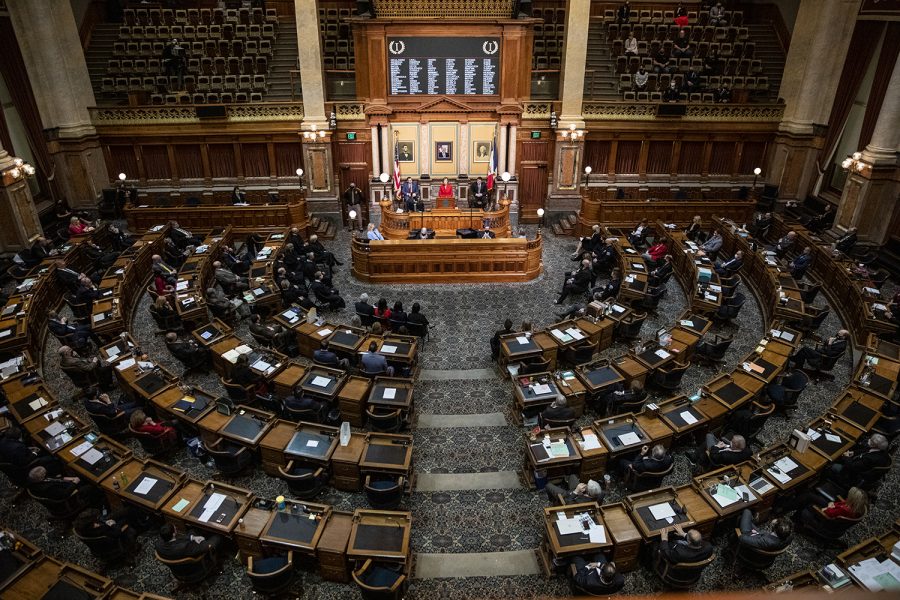Bill prohibiting ‘divisive concepts’ in DEI training passes Iowa House along party lines
A bill to protect free speech in higher education institutions was approved by the Iowa House with bipartisan support, which was then followed by hours of partisan debate on DEI training on Tuesday.
Gov. Kim Reynolds gives the State of the State address in the house chamber of the Iowa State Capitol on Tuesday, Jan. 12, 2021 in Des Moines. Gov. Reynolds highlighted in the address expansion of broadband internet, a push for in-person learning, and economic recovery from the COVID-19 pandemic.
March 16, 2021
Lawmakers in the Iowa House passed two bills related to education and free speech on Tuesday, including one that will prohibit “divisive concepts” from diversity, equity and inclusion training in schools, universities, and government institutions, resulting in hours of debate.
Introduced by Rep. Steven Holt, R-Denison, House File 802, which passed 59-38, labels 10 topics as “divisive concepts.” These concepts include labeling the U.S. or Iowa as fundamentally or systemically racist and stating individuals bear responsibility for actions committed by their race or sex in the past. The legislation would prohibit these topics from being included in diversity, equity and inclusion training and from being taught in school curriculum.
“I reject absolutely and with great enthusiasm, the idea that we must adopt racist ideology and scapegoat races of people, marking each individual is either oppressor or oppressed, in order to stop racism and foster inclusiveness,” Holt said in his opening statement.
The bill originally only pertained to school districts and public higher education institutions, but an amendment filed by Holt and adopted by a 59-38 vote expanded the legislation’s impact to include government agencies, entities and subdivisions. This includes county boards of supervisors, city councils, and entities in the judicial branch.
“No one from any of our agencies from our local governments, anywhere, had any time to come to us and give any input on this at all,” said Rep. Christina Bohannan, D-Iowa City, who rose in opposition to the amendment. “[They] didn’t even have time to ask questions about what the bill does or covers because the entire time, as bad as the bill was, it was all about the universities, and then just like that on a dime, it just explodes into the entire state government. I think that is very bad process.”
The Iowa Senate approved a bill with similar language on March 8, but the Senate version, SF478, does not expand to government entities.
Both bills include language almost identical to an executive order from former President Donald Trump, which was later rescinded by President Joe Biden, which sought to make students more “patriotic” by prohibiting the teachings of systemic racism in DEI training.
Democrats expressed concerns that issues like white privilege and implicit bias could become prohibited by the bill. In closing remarks, Holt said the bill will not halt implicit bias training or teaching history, but rather it can’t frame the whole country, state, or all white people as racist.
Additionally, divisive concepts as part of a larger course of academic instruction or in response to questions during training are not prohibited, but Republicans did not define what a “larger conversation” would look like.
“The bill says that you can respond to issues that come up and that’s part of my concern,” said Rep. Ross Wilburn, D-Ames. “Because I think even just here tonight, seeing the importance of being able to discuss concepts planned fully with intent, so that a trainer, when they come into a classroom, can help keep it a conversation, not where people aren’t going to get uncomfortable, but so that we can agree on some guidelines.”
Republicans supporting the bill acknowledged racism and sexism, but said blanket accusations stifle progress.
“I do believe the term white privilege is racist on its face,” said Rep. Jeff Shipley, R-Fairfield. “I believe when the term white privilege is used, that does judge me based on the color of my skin just as Dr. Martin Luther King advised people not to do. So, it is a term that I think is just very incomplete and woefully inadequate to accurately describe what we’re seeing in society.”
Earlier on Tuesday, the House approved a separate bill on First Amendment training in regents universities with bipartisan support.
House File 744, which was approved 97-1, says that the state Board of Regents must ensure that university faculty and administration, and those who have oversight of student government organizations and distribute activity fee funds, understand the institution’s policies and regulations regarding freedom of speech. The bill also states that any statement a university official makes about policy matters must be in collaboration with the state Board of Regents.
Republicans in the Legislature have accused regents institutions of suppressing conservative voices on campus. HF744 also states that universities must publicly post their policies on handling free speech and the procedure for how the university handles a possible complaint that a student or faculty members’ free speech is being stifled.
During the debate on HF802, Democrats said it was ironic to debate the bill that prohibited topics after just passing a bill on freedom of speech with bipartisan support.
“The free speech bill says no topic is off the table, not even topics that create discomfort or cause offence,” Bohannan said. “But when it comes to diversity training, this bill prohibits talking about divisive concepts … I think that this bill undermines our credibility on free speech issues and makes us look like we only care about one side of free speech.”



